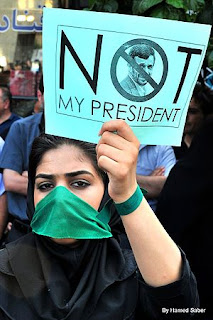
The Los Angeles Times
The opposition plans large demonstrations Wednesday, the first in six weeks. But in the West, some analysts have begun to discount the opposition movement's power. Students in the western Iranian city of Ahvaz in recent days launched an impromptu protest in a campus auditorium. In Kashan on Monday, a group took over the campus cafeteria, singing anti-government songs. A couple of weeks ago in Tehran, others cheered wildly as someone threw a shoe at President Mahmoud Ahmadinejad's former culture minister. Then on Monday, students shouted down the ex-minister, Mohammad-Hossein Saffar-Harandi, once again. Largely absent from international media reports and discounted by Western policymakers more focused on Iran's nuclear program, the protest movement that erupted after Ahmadinejad's disputed June 12 reelection has continued to smolder, mostly on college campuses. Defying warnings by security officials, protesters plan to stage their first large public gatherings in six weeks on Wednesday. This time they plan to turn an annual nationwide march commemorating the 1979 takeover of the U.S. Embassy, held on the 13th day of the Persian calendar month of Aban, into an anti-government rally.
"The 13th of Aban is another appointment for us," opposition leader Mir-Hossein Mousavi said in a statement published by reformist websites. "It is here to remind us, once again, that the people are the leaders." In the West, some analysts have begun to discount the opposition movement's ability to affect Tehran's decision-making. Some say months of repression have gutted the protest movement of its organizational capacity and leadership. "Our view is that the regime has largely neutralized the opposition," said Mark Fowler, a former CIA analyst who now heads Persia House, a service run by the Booz Allen Hamilton consulting firm in Washington. "It seems to us that they have pretty much decapitated the opposition in terms of leadership. I don't think the government is particularly worried about it." Many also doubt the opposition's ability to serve as an alternative to the hard-liners who have the upper hand in Tehran. "Mousavi is not a liberal per se," said Fowler. "When he was prime minister, he would have made the conservatives and the hard-liners proud." (Read more...)





